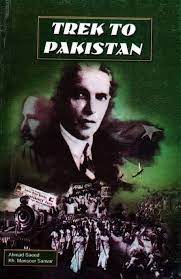Pakistan Affairs is one of the compulsory subjects. Making Pakistan Affairs a compulsory subject in the CSS exam ensures that civil servants are equipped with the knowledge and understanding necessary to serve their country effectively across various domains. It helps in producing well-rounded professionals who can contribute positively to the development and governance of Pakistan. This subject overlaps with the Current Affairs which is the other compulsory subject. During the preparation, one should keep in mind that after allocation one should have to solve the problems. So, for this Civil service jobs need to be well-prepared to handle crises and emergencies. Understanding the historical context and current affairs is crucial for making informed decisions during challenging times.
Pakistan Affairs topics not only overlap but also historical background is required for current affairs subjects. The examiner demands the connection between the different events which have a resemblance with the past events that give a glimpse of an idea about the outcomes and solutions. Hence, a thorough study of the situation and chain of events that were held in the past is vital for the practical job and for exams as well.
1-The ideology of Pakistan—–definition and elucidation, historical aspects: Muslim rule in
the Sub-Continent, its downfall and efforts for Renaissance. Movements for
reforms– Shaikh Ahmad Sarhindi, Shah Waliullah, Sayyid Ahmad Shaheed,
Aligarh, Deoband, Nadwah, and other educational institutions——-Sindh
Madrassah and Islamia College Peshawar. Ideology of Pakistan in the light of
Speeches and statements of Allama Iqbal and Quaid- i Azam Muhammad Ali
Jinnah.
II. Land and people of Pakistan——- Geography, Society, Natural resources,
Agriculture, Industry and education with reference to characteristics, trends and problems.
III. Pakistan and Changing Regional Apparatus
IV. Nuclear Program of Pakistan, its Safety and Security; International Concerns
V. Regional Cooperation Organizations (SAARC,ECO,SCO) and the Role of Pakistan
VI. Civil-Military Relations in Pakistan
VII. Economic Challenges in Pakistan
VIII. Non-Traditional Security Threats in Pakistan: Role of Non-State Actors
IX. Pakistan’s Role in the Region
X. The Palestine Issue
XI. Changing Security Dynamics for Pakistan: Challenges to National Security of
Pakistan
XII. Political Evolution Since 1971
XIII. Pakistan and US War on Terror
XIV. Foreign Policy of Pakistan Post 9/11
XV. Evolution of Democratic System in Pakistan
XVI. Ethnic Issues and National Integration
XVII. Hydro Politics ; Water Issues in Domestic and Regional Context
XVIII. Pakistan’s National Interest
XIX. Challenges to Sovereignty
XX. Pakistan’s Energy Problems and their Effects
XXI. Pakistan’s Relations with Neighbors excluding India
XXII. Pakistan and India Relations Since 1947
XXIII. The Kashmir Issue
XXIV. The war in Afghanistan since 1979 and its impact on, and challenges to Pakistan in the Post 2014 era.
XXV. Proxy Wars: Role of External Elements
XXVI. Economic Conditions of Pakistan, the Most Recent Economic Survey, the Previous
and Current Budgets, and the Problems and Performance of Major Sectors of
Economy.
XXVII. The Recent Constitutional and Legal Debates, the Latest Constitutional
Amendments and Important Legislations, Legal Cases, and the Role of Higher
Courts.
XXVIII. The Prevailing Social Problems of Pakistan and the Strategies to Deal with Them,
Poverty, Education, Health and Sanitation.
Here below is the list of recommended books by FPSC:
Suggested Readings
| Title Of Books | No |
| Federalism and Ethnic Conflict Regulation in India and Pakistan. | 1. |
| Perception, Politics, and Security in South Asia: The Compound Crisis in1990. | 2. |
| Labor, Democratization, and Development in India and Pakistan. | 3. |
| The Future of Pakistan. | 4. |
| Frontline Pakistan: The Struggle with Militant Islam | 5. |
| Modern South Asia: History, Culture, Political Economy | 6. |
| Democracy and Authoritarianism in South Asia. | 7. |
| Conflict Between India and Pakistan: an Encyclopedia. | 8. |
| Perception, Politics and Security in South Asia: The Compound Crisis in1990. | 9. |
| Judging the State: Courts and Constitutional Politics in Pakistan. | 10. |
| Pakistan: Manifest Destiny. | 11. |
| Pakistan, America, and the Future of Global Jihad. | 12. |
| Kashmir in Conflict: India, Pakistan and the Unending War. | 13. |
| Islamic Law and the Law of Armed Conflict: The Armed Conflict in Pakistan. | 14. |
| Making Sense of Pakistan. | 15. |
| A Brief History of Pakistan. | 16. |
| Powering Pakistan: Meetings Pakistan Energy Needs in 21st Century | 17. |
| Pakistan’s Energy Sector: From Crisis to Crisis-Breaking the Chain | 18. |
To be honest, despite the fact that thorough knowledge is required, you don’t need to go through all of these books. A few books are provided below and also from the recommended books are quite sufficient to get the whole idea of the political background of Pakistan. One more thing you need to do is write the references of the books . Make a separate notebook and write down the important points with the book reference if you can go with the page number of your reference then you can do that. It has an effective impact on the examiner. At this point, I am sharing a few books below that provide all entire details of Pakistan’s History.

This book covers all of the topics before partition.As it is clear from the name of the book it means a out struggle for Pakistan . This book covers all the steps and important events from the War of Independence 1857 to Pakistan 1947.
Well, in spite of that these books provide complete step-by-step particulars but some students prefer guide books. That’s why here below is the well-known author guidebook for this subject. The name of the guidebook writer is Advanced Publishers.


CSS Punjabi Complete Guide With the Book,Notes,Solved MCQs,Past Papers
The Significance of General Science & Ability as a Compulsory Subject
CSS and PMS Precis Writing Rules with Complete Guide
Ministry of Interior Jobs Opportunities 2026:Online Apply
Punjab Food Authority and Price control Jobs-Latest Job in PPSC
Ministry of Interior Jobs Opportunities 2026:Online Apply
CSS and PMS Precis Writing Rules with Complete Guide
WAPDA Job Opportunities 2026- Online Apply